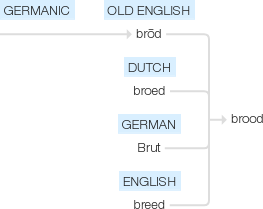Brood
Old English brōd, of Germanic origin; related to Dutch broed and German Brut, also to breed. The verb was originally used with an object, i.e. ‘to nurse (feelings) in the mind’ (late 16th century), a figurative use of the idea of a hen nursing chicks under her wings.
wiktionary
From Middle English brood, brod, from Old English brōd(“brood; foetus; breeding, hatching”), from Proto-Germanic *brōduz(“heat, breeding”), from Proto-Indo-European *bʰreh₁-(“breath, mist, vapour, steam”).
etymonline
brood (n.)
Old English brod "offspring of egg-laying animals, hatchlings, young birds hatched in one nest," from Proto-Germanic *brod (source also of Middle Dutch broet, Old High German bruot, German Brut "brood"), etymologically "that which is hatched by heat," from *bro- "to warm, heat," from PIE *bhre- "burn, heat, incubate," from root *bhreu- "to boil, bubble, effervesce, burn." Meaning "human offspring, children of one family" is from c. 1300.
brood (v.)
mid-15c., "sit on eggs for the purpose of hatching them," from brood (n.). The figurative meaning "meditate long and anxiously" (to "incubate in the mind") is first recorded 1570s, from notion of "nursing" one's anger, resentment, etc. Related: Brooded; brooding. Brood mare "female horse kept for breeding" is from 1829.
